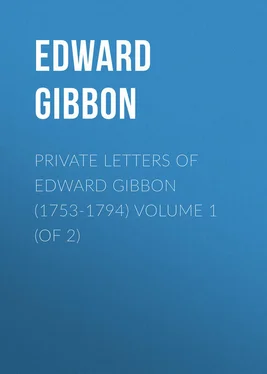Edward Gibbon - Private Letters of Edward Gibbon (1753-1794) Volume 1 (of 2)
Здесь есть возможность читать онлайн «Edward Gibbon - Private Letters of Edward Gibbon (1753-1794) Volume 1 (of 2)» — ознакомительный отрывок электронной книги совершенно бесплатно, а после прочтения отрывка купить полную версию. В некоторых случаях можно слушать аудио, скачать через торрент в формате fb2 и присутствует краткое содержание. Жанр: foreign_antique, foreign_prose, на английском языке. Описание произведения, (предисловие) а так же отзывы посетителей доступны на портале библиотеки ЛибКат.
- Название:Private Letters of Edward Gibbon (1753-1794) Volume 1 (of 2)
- Автор:
- Жанр:
- Год:неизвестен
- ISBN:нет данных
- Рейтинг книги:3 / 5. Голосов: 1
-
Избранное:Добавить в избранное
- Отзывы:
-
Ваша оценка:
- 60
- 1
- 2
- 3
- 4
- 5
Private Letters of Edward Gibbon (1753-1794) Volume 1 (of 2): краткое содержание, описание и аннотация
Предлагаем к чтению аннотацию, описание, краткое содержание или предисловие (зависит от того, что написал сам автор книги «Private Letters of Edward Gibbon (1753-1794) Volume 1 (of 2)»). Если вы не нашли необходимую информацию о книге — напишите в комментариях, мы постараемся отыскать её.
Private Letters of Edward Gibbon (1753-1794) Volume 1 (of 2) — читать онлайн ознакомительный отрывок
Ниже представлен текст книги, разбитый по страницам. Система сохранения места последней прочитанной страницы, позволяет с удобством читать онлайн бесплатно книгу «Private Letters of Edward Gibbon (1753-1794) Volume 1 (of 2)», без необходимости каждый раз заново искать на чём Вы остановились. Поставьте закладку, и сможете в любой момент перейти на страницу, на которой закончили чтение.
Интервал:
Закладка:
HIS FATHER'S SECOND MARRIAGE
A tear to poor Nell; she really deserves it. Am glad Nemmy is well married. Would write to my aunt Hester, [6] Footnote_6_6 Miss Hester Gibbon died unmarried in 1790, at the age of eighty-six, at King's Cliffe in Northamptonshire. William Law, the author of the Serious Call , originally her brother's tutor at Putney, afterwards her almoner, spiritual adviser and guide, died at her house in 1761. In the tomb which she caused to be built for him, she was also herself buried. Hester Gibbon is stated to have been the Miranda of the Serious Call ; but her age at the date when the book was published (1728) makes this doubtful.
but know not what to say to her. You tell me Snell and Milton are gone; where? Compliments to Bett Gilbert and to the Darrels [7] Footnote_7_7 The second daughter of Mr. James Porten married Mr. Darrel of Richmond, and left two sons, Edward and Robert.
since you are at Richmond. I hurry over; but, à propos , who directed your letter, for it is not your hand? I hurry over all these things to come to my father's marriage.
About a fortnight ago I received a vastly kind letter from my father of the 18th of August (inquire the day of his marriage). He forgave me in it all my past faults, promised never to speak of them again to me, provided only I kept the promises I had made him about my future behaviour; allows me to make a little tour about Switzerland, which I had asked him, and tells me that, after having completed my studies and my exercises, he would make me make that of France and Italy. But not a syllable about his marriage. [8] Footnote_8_8 Gibbon's father married his second wife, Miss Dorothea Patton, in 1755.
Three days after I heard of it by the canal of a certain Mr. Hugonin, whose father is our neighbour in Hampshire, but without any particularities either of name or anything else. Guess my surprise; you know he had always protested that he never would marry again – at least, had he done it in the time he was angry with me, I should have been less struck; but now what can he mean by it? What frightens me most is what I remember you told me; if my father married again, by my grandfather's will the estate went to the children of the second bed, and that I had only 200 a year, provided the second wife had more fortune than my mother, who had only £1500. You may easily guess the anxiety that has put me in. I have wrote to a friend in England, who I think I can trust to get me a copy of that will out of Doctors' Commons; but though sure of his discretion, I do not know whether he will care to serve me. Could you not do it YOURSELF? and inquire whether my father has not taken care of me by his marriage contract.
You say that Mrs. Gibbon (Miss Patton) has set my father against the Mallets. [9] Footnote_9_9 David Mallet, or Malloch, poet, playwright, and miscellaneous writer (1705-65), is best known for his ballad of William and Margaret , his unsubstantiated claim to the authorship of Rule Britannia , and his edition of Bolingbroke's works. Bolingbroke, said Dr. Johnson, had "spent his life in charging a gun against Christianity," and "left half-a-crown to a hungry Scotchman to draw the trigger." Mallet was "a great declaimer in all the London coffee-houses against Christianity," and the obtrusion of his sceptical views made his household unpleasing to David Hume. To his house Gibbon was taken after his reception into the Church of Rome.
I do not know if 'tis so very good a sign. Since she was intimate with him when I was under Ward's [10] Footnote_10_10 A well-known doctor of the day.
hands, I should think you must have heard something of her. Do make some inquiries about her and send them me. I wonder what will become of my poor cousin. She will be sold at last. Since they are in France, and that the war is going to break out, what if they should come to Lausanne?
YOUNG TRAVELLERS.
*Now for myself. As my father has given me leave to make a journey round Switzerland, we set out to-morrow. Buy a map of Switzerland, 'twill cost you but a shilling, and follow me. I go by Iverdun, Neufchâtel, Bienne or Biel, Soleure or Solothurn, Bâle or Basil, Bade, Zurich, Lucerne, and Bern. The voyage will be of about four weeks; so that I hope to find a letter from you waiting for me . As my father had given me leave to learn what I had a mind, I have learned to ride, and learn actually to dance and draw. Besides that, I often give ten or twelve hours a day to my studies. I find a great many agreeable people here; see them sometimes, and can say upon the whole, without vanity, that, tho' I am the Englishman here who spends the least money, I am he who is the most generally liked. I told you that my father had promised to send me into France and Italy. I have thanked him for it. But if he would follow my plan, he won't do it yet a while. I never liked young travellers; they go too raw to make any great remarks, and they lose a time which is (in my opinion) the most precious part of a man's life. My scheme would be, to spend this winter at Lausanne – for tho' 'tis a very good place to acquire the air of good company and the French tongue, we have no good professors – to spend (I say) the winter at Lausanne; go into England to see my friends a couple of months, and after that, finish my studies, either at Cambridge (for after what's past one cannot think of Oxford), or at a university in Holland. If you liked the scheme, could you propose it to my father by Metcalf, or somebody else who has a certain credit over him ? I forgot to ask you whether, in case my father writes to tell me his marriage, would you advise me to compliment my mother-in-law? I think so. My health is so very regular that I have nothing to say about it.
I have been the whole day writing you this letter; the preparations for our voyage gave me a thousand interruptions. Besides that, I was obliged to write in English. This last reason will seem a parradox, but I assure you the French is much more familiar to me.* À propos , do you know anything of my Lord Newnham? [11] Footnote_11_11 George Simon (1736-1809), Viscount Nuneham, afterwards second Earl of Harcourt, eldest son of the first earl. He was remarkable for his affectation of French manners and fashions.
I heard he was in Germany.
5.
To his Father
Mon très cher Père,
Je reçus hier votre lettre avec beaucoup de plaisir, mais qui ne fut pas tout-à-fait sans mélange d'Inquietude. Je craignois vous avoir encore offensé par quelque nouvelle faute. Vous savez combien une affection vive et sincère prend facilement l'allarme aux plus grandes minucies. Je fus frappé en ouvrant votre lettre de voir votre style ordinaire de Dear Edward changé en un froid Monsieur. Il est vrai que la suite me rassura; j'y voyois un Père tendre qui vouloit bien entrer dans mes peines, les soulager, et me delivrer de toutes mes craintes, en m'assurant que, si je me conduisois toujours d'une façon conforme à mon devoir, le nouvel engagement qu'il avoit pris ne me porteroit aucune prejudice. J'espère que je me connois assez à présent pour pouvoir regarder cette condition comme une promesse absolue. En effet si je m'en écartois, avec quels yeux pourrois-je me regarder moi-même après m'être coupable d'une aussi noire ingratitude pour tant de bonté? Ce trait dont vous me faites part au sujet de votre nouvelle épouse, me la fait déjà aimer d'avance. Je n'aurai pas beaucoup de peine à considérer comme ma mère celle qui, ne pouvant pas me donner la vie, me l'a au moins rendu. J'aurai l'honneur de lui en faire mes très humbles remerciemens, et de l'assurer des vœux qui je fais pour son bonheur. Pour vous, mon très cher Père, je puis vous protester dans la sincerité de mon cœur que tous ceux que je fais à votre sujet ont pour unique but votre felicité mutuelle. Puissiez-vous gouter tous les agreémens d'une Union fondée sur l'amour et l'estime, et puisse je vous réiterer ces mêmes souhaits pendant une longue suite d'années.
Читать дальшеИнтервал:
Закладка:
Похожие книги на «Private Letters of Edward Gibbon (1753-1794) Volume 1 (of 2)»
Представляем Вашему вниманию похожие книги на «Private Letters of Edward Gibbon (1753-1794) Volume 1 (of 2)» списком для выбора. Мы отобрали схожую по названию и смыслу литературу в надежде предоставить читателям больше вариантов отыскать новые, интересные, ещё непрочитанные произведения.
Обсуждение, отзывы о книге «Private Letters of Edward Gibbon (1753-1794) Volume 1 (of 2)» и просто собственные мнения читателей. Оставьте ваши комментарии, напишите, что Вы думаете о произведении, его смысле или главных героях. Укажите что конкретно понравилось, а что нет, и почему Вы так считаете.












